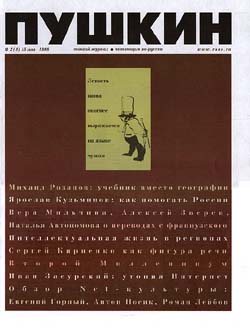
PUSHKIN #8. SUMMARY
In his opening article Sergei Zemlyanoi analyzes the "loci communes", or commonplaces, of modern political discourse. Shedding light upon the existing political culture, these topoi (of the President's "unpredictability", the "juvenile" topos, etc.) are aimed at making events and realities acceptable to the public at large. Leonid Kroll reviews the 4-volume "Evolution of Psychiatry". Such an edition is quite pertinent to the current situation in Russia, since the role of psychotherapy in a culture experiencing itself as a teenager willing to know what he is and will be is hard to overestimate.
Natalia Avtonomova reflects on translation. In her opinion, it does not boil down to a purely linguistic undertaking, but is also the translation of one culture into another. Since there is always something that remains untranslated, it is for the translator to decide upon the strategy of his or her omissions. Maria Arbatova reviews the recently published translation of Simone de Beauvoir's "The Second Sex" dwelling not only on de Beauvoir's basic postulates - the ABC of modern feminism, - but also on the vicissitudes of the reception of such books in Russia today.
Continuing the topic of translation, Vera Milchina focuses both on the textual characteristics of Cardinal de Retz's memoirs lately published in Russian and on the coherent conception of the translation as exemplified in the work itself and in Yu.Yakhnina's clearly formulated afterword. Alexei Zverev, reviewing the selected prose of Maurice Blanchot, is, on the contrary, quite critical about the efforts of Victor Lapitsky, finding his comments to the text rather obscure. Zverev also seems to be skeptical about Blanchot himself taken from a purely literary angle.
"Pushkin" editor-in-chief Gleb Pavlovsky reviews several recently published books on the intelligence service and its officers each of whom is surrounded with a unique mythical aura. However, irrespective of the differences separating individual intelligence officers and even ideological systems, there exists a basic structural unity of intelligence as an institution of state control.
Andrei Deryabin analyzes the task of constructing a national idea and a national identity as it was fulfilled in a series of TV sequences released in 1995-1996. The reinterpretation of the Russian past is characterized, in the author's opinion, by a selective approach to real historical events and by the exploitation of the idea of continuity.
Yaroslav Kuzminov discusses the possibilities of a transition from scientific and technological assistance enjoyed by Russia from the West to various credits, including investment credits. He draws his examples from the diverse activities of The Higher School of Economics. In the same section "Culture as Politics" Mikhail Rozanov examines the status of geography not only as an "objective science", but also as a subject in the school curriculum, a subject being rather poorly taught.
Comparing the Soviet past and the topsy-turvy present, Victor Toporov expands on "the ethnopsychology of literary consumption", while Leonid Lerner, focusing on the genre of erotic writings and its invariables, treats this type of mass literature as "sexual folklore".
In a playful and ironic manner Yelena Mulyarova recites her own almost unbearable experience as a commercial writer of romance, presenting it in terms of automatic writing habits.
Samuel Huntington's essay is a scholarly investigation of the "third wave" of democracy (begun in Portugal in 1974) and its consequences for the whole of the world. According to Huntington, one of the features of the third wave is the spread of democracy, European in nature, to countries of the non-Western world. Drawing a distinction between electoral and liberal democracies, the latter being fundamentally based upon human rights and civil society, Huntington defines today's priority as the transformation of already existing electoral democracies into liberal ones.
In the following section titled "Not Far from Moscow" Cyril Pletner describes the sad lot of village libraries, whereas Alexander Fominykh discards the myth of the Russian province as a "red [i.e. communist] belt". The texts are followed by a schedule of regional intellectual events.
Reviewing Pierre Levy's best-selling "L'intelligence collective: pour une anthropologie du cyberespace", Ivan Zasursky reconstructs four basic anthropological spaces according to Levy (Earth, Territory, Market, Knowledge) as well as the author's vision of 21st century economy dominated by ethical competition for the public good. Mark Pechersky's texts on Oriental markets, Las Vegas and travelling as a pastime are united by a writer's keen interest in the distinct features of different cultural experiences. Vadim Rabinovich's essay devoted both to Jan Amos Komensky and a recent artistic project based on his famous book addresses the question of how the past can be part of the future, a question already articulated in the very name of the section "World. Millennium. Transition". The desired continuity may be achieved if the word co-exists in various cultural spaces and is thus a timeless event - such is the author's response.
|

